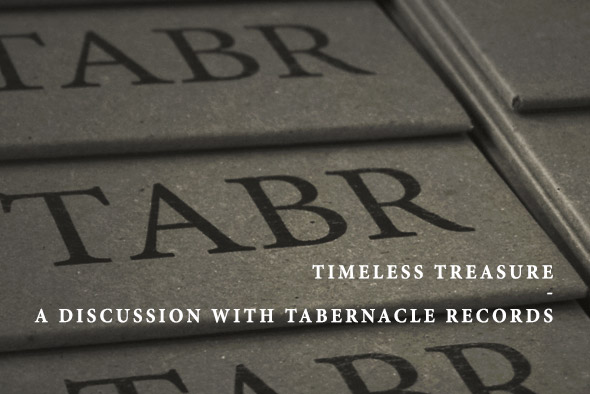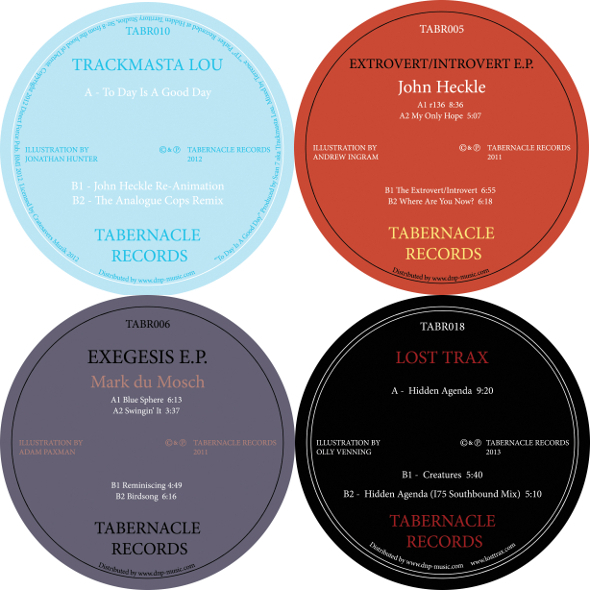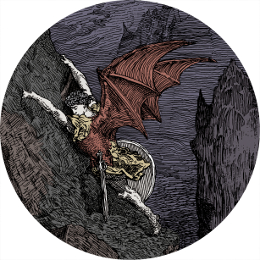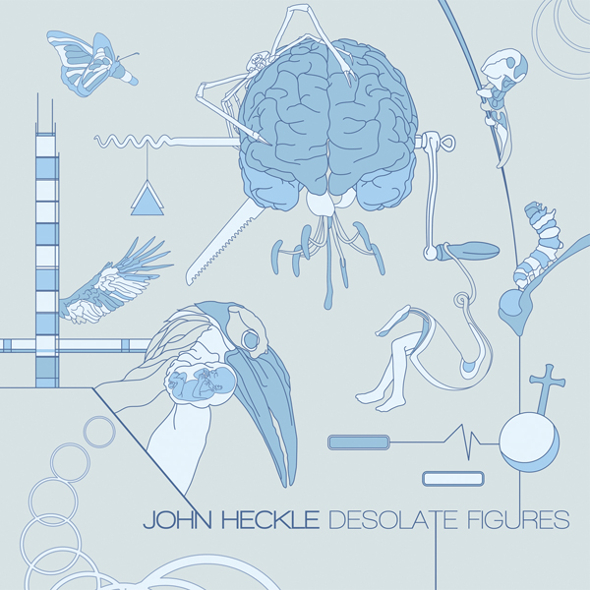Timeless Treasure: A Discussion with Tabernacle Records

For our final label feature of the year, the trio behind Tabernacle Records speak to Richard Brophy and turn in a mix of label highlights and current influences.
Established in Glasgow in 2010, Tabernacle is steeped in the Scottish city’s musical heritage. It embraces the US techno, house and electro sounds that have been the dominant soundtrack in the city’s clubs since the late 80s. While it’s hard to describe a Tabernacle release without using the word ‘timeless’, it also true that the label stands out because it pushes the confluence of these classic styles forward. Run by brotherly duo Jasper and Joel along with Andrew Ingram, in a city rich with well-known venues and nights, it is no surprise that the label traces its roots back to the Slabs of the Tabernacle parties that Joel ran with Ingram and a few others.
“It grew out of a club night, which started off as monthly basement parties in Glasgow in 2008,” Joel explains, while Andrew says that their approach to running parties differed to others in Glasgow; the city “had been saturated with techno for years, so we focused on getting debuts from DJs and live acts that hadn’t already played”.
“I became friends with Andrew when I was a student in Edinburgh around 2005/06,” Joel recalls. “At that time it seemed as if we were coming to Glasgow fairly regularly to go to parties like Monox. What was going on was pretty exciting and both of us eventually set up a club night.”
“The label started a couple of years into the club night and it felt like a logical progression. It was pretty evident we all shared the energy and passion to be involved in something like a vinyl label and so it was just a case of working out how to do it at first. We were fortunate enough to have received guidance from Arne Weinberg, whose advice (and fine whisky) was a real help in showing us how to get things off the ground,” he adds.
 Once the trio had ‘bonded over 90s techno’, Andrew explains that Jasper helped to fund the first release and got involved with the nascent label. The club night, whose name was inspired by the sci-fi epic Zardoz, still happens sporadically. Its spirit lives on in the form of the Slabs of the Tabernacle website, which features over 180 DJ mixes from the label’s owners and affiliates as well as live recordings from some of the Slabs nights.
Once the trio had ‘bonded over 90s techno’, Andrew explains that Jasper helped to fund the first release and got involved with the nascent label. The club night, whose name was inspired by the sci-fi epic Zardoz, still happens sporadically. Its spirit lives on in the form of the Slabs of the Tabernacle website, which features over 180 DJ mixes from the label’s owners and affiliates as well as live recordings from some of the Slabs nights.
Although Andrew rightly observes that the “internet is saturated with websites like this now, everyone hopping across to the latest one”, Joel remarks that the Slabs site is “a treasure trove”. As both Andrew and Jasper are now based in London, the website remains a constant in Tabernacle’s world. Joel says that Glasgow remains the label’s ‘spiritual home’, even though the day-to-day work takes place in London.
In a nod to its Glasgow roots, Tabernacle’s debut release focused on artists who had all previously played at the club night – The Third Man, John Heckle, Arne Weinberg and passEnger. However, Joel remarks that “things have opened up a lot since then. It is entirely to do with what the music sounds like and if it fits into what the label is trying to achieve. That is not to say that it isn’t rooted somewhere, just perhaps not in the traditional sense”.
“In terms of our different tastes, it would be very limiting to purely focus on our local musical environment,” Jasper adds. “In saying that though, I do like the idea of specifically representing a community within music and in other aspects of life. However, in the age of the internet I don’t really think such clearly defined boundaries exist anymore, at least within electronic music.”
The bad news for anyone who is considering sending Tabernacle a demo is that to date, it has only put out one release from unsolicited contact. As Andrew explains, they prefer to “go through the whole creative process ourselves if we can; from discovering an artist, discussing their tracks, sourcing artwork and finally releasing the product.”
What’s refreshing about Tabernacle is that its owners are music collectors first and foremost, whose tastes converge at the blurry intersection where acid, techno, house and electro meet. This is reflected in the catalogue, with the rickety hardware rhythms of The Analogue Cops sitting next to Trackmasta Lou’s driving US techno, Lost Trax’s string-led electro and the abstract noise of Anom Vitruv.
There are musical differences between each owner/collector, with Andrew saying that he stays ‘well away from hype labels, and budgets in plenty of acid, spacey stuff, albums. I’m sadly also a sucker for anything that is well presented, through concept or packaging”.
“These days unless you’re on some promo list, got a hefty salary, or have no other hobbies you might as well stick to buying old titles; the price of new vinyl takes the piss,” he believes.
Jasper says he is mainly interested in electronic music from the 90s, including ambient and electro and also collects reggae, while Joel explains that “we all have record collections that consist heavily of these styles – (classic Detroit and Chicago house, techno and electro) – and this inevitably comes out in the releases. I see Tabernacle Records as a techno label, as this is where we all meet in the middle.”
 Refreshingly, Tabernacle’s owners are comfortable to act as facilitators and none of them have the desire to reinvent themselves as producers now that their label has gained recognition. “I thoroughly enjoy sourcing artists or producing artwork to accompany each individual release. The label is run in our spare time, so we might as well focus on one part and leave the music to the others for now,” says Andrew. Jasper says he feels “more comfortable just getting on with putting music out”, while Joel observes that “it’s important that people do things for the right reasons: I’m quite happy DJing when I get the chance”.
Refreshingly, Tabernacle’s owners are comfortable to act as facilitators and none of them have the desire to reinvent themselves as producers now that their label has gained recognition. “I thoroughly enjoy sourcing artists or producing artwork to accompany each individual release. The label is run in our spare time, so we might as well focus on one part and leave the music to the others for now,” says Andrew. Jasper says he feels “more comfortable just getting on with putting music out”, while Joel observes that “it’s important that people do things for the right reasons: I’m quite happy DJing when I get the chance”.
The owners’ years spent collecting records and DJing means the label is home to some under the radar but inspired releases, music that might not have registered with other imprints. The second record that Tabernacle put out was the mind-bending electro of Long Slow Heat Death, a split release by UK and Scottish electro acts Fancy & Spook and Ditone. Subsequently, the label also tapped Dutch producer Mark Du Mosch and Scan 7’s Trackmasta Lou.
“I picked up Mark’s first release on Keynote in Osaka, Japan of all places,” Andrew says, explaining how the label connected with the Dutch producer. “On return, we got in touch to book him for a live set, not realising that he was also a talented and energetic DJ. His production is distinctive; you can always recognise one of his tracks.”
Jasper points out that he had been a huge fan of Trackmasta Lou, Scan 7 and his various other incarnations since he first discovered techno. When the opportunity presented itself to release some of the Detroit artist’s music, he pounced.
“There was a track of Lou’s on MySpace that I’d known about for some time and I was curious, as I hadn’t seen it released anywhere. I contacted him and he was up for releasing it. It was great for that connection to have taken shape in the physical form of a release on the label,” he explains. In other instances, Tabernacle has used a more old-fashioned approach to A&Ring.
Joel says that “overall, the way in which we have come to work with artists on the label has been pretty varied. For example, we met Daniel Andréasson on the Freerotation campsite in 2007. We immediately became friends and six years on, we’re releasing his third 12” on the label”.
 For this writer, Tabernacle’s most impressive signing is not John Heckle – more about him later – but the mysterious Lost Trax, who had put out the jaw-dropping, UR-inspired Saturiun System on SCSI-AV back in 2006. To date, the label has released two split EPs from Lost Trax and Connection Machine, with this year’s Hidden Agenda marking his/her first solo record for Tabernacle. According to the label, the artist behind Lost Trax has been around a while and this is one of his side-projects.
For this writer, Tabernacle’s most impressive signing is not John Heckle – more about him later – but the mysterious Lost Trax, who had put out the jaw-dropping, UR-inspired Saturiun System on SCSI-AV back in 2006. To date, the label has released two split EPs from Lost Trax and Connection Machine, with this year’s Hidden Agenda marking his/her first solo record for Tabernacle. According to the label, the artist behind Lost Trax has been around a while and this is one of his side-projects.
“A friend of ours tipped us off as to who he was and we jumped on the opportunity to put his stuff out. You can probably work it out his identity if you joined all the dots, and I’m sure he’ll come out of hiding at some point – his music has that deeply emotive and nostalgic sound that is hard to ignore,” Andrew explains. Jasper adds that “when we heard his stuff we were all instantly hooked”, while Joel notes that “the music Lost Trax makes is powerful stuff. The Saturiun System is completely timeless.”
Apart from Lost Trax, Fancy & Spook and Ditone, the label has also put out material by VC-118A and Mark Forshaw. What do Tabernacle’s owners make about the current wave of electro releases – do they see it as a positive thing?
“Yeah, we like electro, it’s peculiar, alien, cold, sparse, heavy; it’s lots of things. Labels like Frustrated Funk are keeping releases interesting with their modern take on it. Every now and then an artist appears with something new to add to the genre, such as Morphology, The Exaltics, and more recently Ekman,” Andrew believes. Joel adds that “there seems to be a lot of quality electro being made, which is a good thing. I have enjoyed the output of the likes of Versalife, Morphology, Boris Divider, Shemale and I’m feeling the Black Narcissus release on Signals most recently”.
The challenge for a label like Tabernacle is to strike a balance between putting out music that the owners feel passionate about and making it work financially. While no one expects a release by VC-118A to storm the charts, Joel believes that releasing that style of music “is undoubtedly more risky, certainly in the UK. There would appear to be less of a demand for electro vinyl releases. We also experienced similar difficulties with electro club nights, but this has never deterred us from continuing to promote electro music”.
Andrew bemoans the fact that it is rare to see electro acts getting booked for clubs and agrees that is a greater challenge to sell each electro release. “Of course it is never going to be popular – there are no so-called revivals in the pipeline, but that doesn’t stop us,” he remarks. Jasper believes that house records have a broader appeal because “the general slower pace and rhythm of house music makes it more palatable and easy listening on the ear”. But he adds that it is “satisfying to be in a position where we can put out electro and more abstract records without it having too much impact on the sustainability of the label”.
“We were fortunate enough to have received guidance from Arne Weinberg, whose advice (and fine whisky) was a real help in showing us how to get things off the ground.”
Nor do Tabernacle’s owners feel any infinity with the slew of Chicago-inspired records that have been released in the past few years. If anything, the presence of so many identikit releases has inspired the label to venture into different places as Andrew explains: “That whole Chicago thing has made many labels appear identical to the next, all sharing artists and 707s. One of the aims of the label is to vary our output as much as possible from one release to the next. I love labels that are so unique they only put out one style of music, but these are usually the classic labels or genre starters from a time and a place in the past. These days a label like that dries up much quicker, and I would like to keep doing this for a while.”
Jasper admits that he remains blissfully unaware of current trends – “although I am aware that house music has been fairly popular for a number of years” – and does not feel comfortable having the label associated with the music from one location. “We go where our taste takes us and that is reflected in what we perceive to be a relatively diverse output for a contemporary electronic music label. Rather than single out Chicago specifically I’m generally more interested in the techno, acid and house sounds of the 90s across the USA’s Midwest, much of which possess a distinctly gritty, visceral charm,” he adds.
Maybe Chicago house has some relevance to Tabernacle because of its patronage of John Heckle, who has so far released three solo EPs (four if you count his Phantom Planet Outlaws collaboration) and his latest album, Desolate Figures on the label? “I can appreciate that John’s sound is often  described as influenced by Chicago house. I would say that we have been helped a lot by working with him, but whether that is due to a Chicago revival, I’m not so sure. I think it is more down to the fact that John is making extraordinary music,” Joel observes.
described as influenced by Chicago house. I would say that we have been helped a lot by working with him, but whether that is due to a Chicago revival, I’m not so sure. I think it is more down to the fact that John is making extraordinary music,” Joel observes.
Generally, it appears that return visits to Tabernacle are more common than one-off releases. Do the owners place value on developing lasting relationships with artists?
“Absolutely, and I admire other labels that do this, it preserves an identity and prevents homogenization,” says Andrew. “Many artists we would’ve liked to have on board share a similar attitude to us and were happy releasing on their own labels. Once an artist gets picked up by a couple of labels, we tend to stay clear. There is little excitement in every label releasing tracks by the same artists. When you get to know an artist, you can suggest more creative projects as you share ideas. It becomes more pleasurable and so the output is guaranteed to be more successful.”
Jasper adds that repeat releases “help to focus the identity of the label” and that “having a tangible, recognisable identity both in terms of sound and vision is important for us. With adding new artists from time to time, it helps the label to evolve without diluting that identity”. Joel agrees that “building relationships and having close ties is a massive part of what this is about”.
With each release limited to 200-300 copies, Tabernacle certainly isn’t a money-making venture. As anyone who presses up and releases small vinyl editions will attest, these are challenging times, no matter what the exuberant articles about the form’s resurgence claim.
Andrew says that Tabernacle’s owners relish these challenges as long as one release funds the next and the label remains ‘creative and individual’. However, Jasper empathises with one-man operations and says that having three people behind Tabernacle ensures that records appear at a frequent rate, which in turn maintains the label’s momentum.
“Finding a good distributor is also important if you want to put out physical releases. We’ve been very fortunate to strike up a reliable and productive relationship with Johannes at Diamonds & Pearls. With a few of us involved, it means that we can bring our own perspectives and ideas – we have lots of things we disagree on and that helps to keep us on our toes!
“Collectively, we put a considerable amount of time, energy and money into the label. Running a small label is a personal, hands-on process and it is a privilege to be in a situation where we can experience music in this manner,” he adds. Joel agrees that the gains are never financial: “There are a lot of things that are difficult about running a small label but for me the rewards are seeing something come to life, and the positive things that follow on from this, every time a record is released”.
 With over 20 EPs released since 2010, Tabernacle branched out in 2013 into the album format with the release of Heckle’s Desolate Figures. While it covers the same grainy, US-influenced techno sound as his previous releases, did Tabernacle’s owners feel the project was different to putting out an EP?
With over 20 EPs released since 2010, Tabernacle branched out in 2013 into the album format with the release of Heckle’s Desolate Figures. While it covers the same grainy, US-influenced techno sound as his previous releases, did Tabernacle’s owners feel the project was different to putting out an EP?
“This was a massive job, I don’t think we quite realised just how much more work was involved. Luckily we are very happy with the results,” Joel says, while Jasper notes that the main difference was “the scale and cost of the project. From ideas to putting out the album it has probably taken us 12 months, which is quite a long time”.
And yet despite this, Andrew acknowledges that releasing Desolate Figures was “a lot of fun. John made three times as many tracks as we needed and we whittled it down to what tracks would flow in the album format”.
“We didn’t have that dilemma of which tracks we had to leave off the album because the outcome is that we now have a full E.P. of solid dance floor tracks to follow it up,” he adds. “John is experimenting with his production all of the time; I can’t wait to hear what he makes next.”
Tabernacle’s next EP is from Semantica’s Arcanoid, an artist that the label’s owners have been following for some time. The label is also thinking about putting out another album, but only “when the time is right”, Jasper says. For an imprint with such a timeless catalogue, finding the right moment shouldn’t be an issue.
Interview by Richard Brophy
Juno Plus Label Focus Mix: Tabernacle Records – Mixed by Andrew Ingram
NB: As of 2014 Jasper is no longer involved in Tabernacle
Tracklisting:
Boris Divider – Terraformer
KWC 92 – Missing
Sowing Paranoia – Active Galactic
Nimoy – Dort Kommen Die Clowns
Smell The Flesh – Hail Kongo
Vercetti Technicolor – Zombi Squalo
Anom Vitruv – Untitled
Mark du Mosch – Red Jam
Reeko – Segmento 4
The Man Behind The Screen – The Travel
John Heckle – Inhuman Nature
Spock Jr. – Ion (Boccacio Edit)
FunkinEven & Delroy Edwards – X
Paul Johnson – Who’s Psy Is This
Daniel Andréasson – The Preview
Call Super – Black Octagons
Arcanoid – Monocyte
VC-118A – Terminal Code
Ovatow – A Thought
Rich Oddie – Quintessence
Tr One – Viceroy-9c
Terrence Dixon – Band Together
Charles Manier – You Said
Hieroglyphic Being Presents Analogous Doom – The Polyhedron Nest